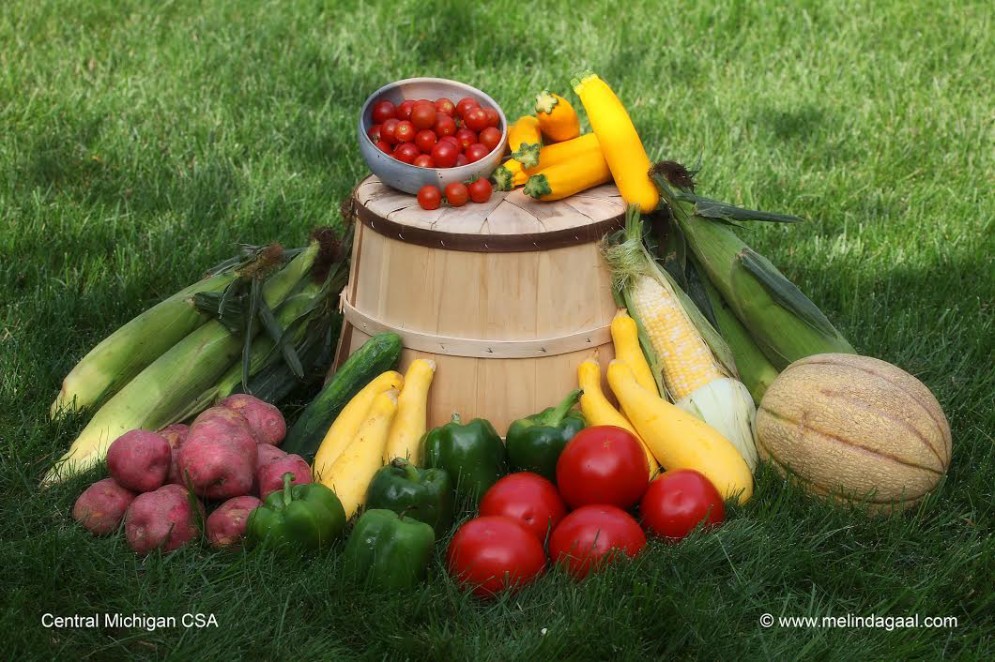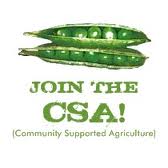Hey There. This is where I log and keep questions folks have asked about the CSA program. If you don’t see your question answered here please ask it in the comments section toward the bottom of this page that way the next person who is wondering the same thing will have an answer too. This page is meant to clarify what the CSA program is and how it works. This page is current for our 2013 season and will be updated every year if changes are made. As always we appreciate your feedback. I am available by phone for any questions you have about the program as well. My Cell # is: 989-284-8251
How does the CSA program Work?
Our CSA program works like this: In the spring (March) people sign up to become members of the CSA and they buy a share. We offer a few different share options, you can learn more about the shares and prices on the “Join the CSA” page. Once you purchase a share you become a member and you’ll get a share of the fresh produce we grow every week. We deliver the produce each week to the location you choose when you become a member. During January we develop a farm plan for the upcoming year and decide how many shares to offer and start getting seeds we don’t already have for the new season. We are a growing farm with a goal of feeding 200 families each year. We always grow 40%-60% more produce than we have plans to market to customers, this allows us to take on members later in the season (June-July).
What Kind of Vegetables Will You Get?
That’s a good question after all you’re the one who is going to have to eat these things. We plant just about any vegetable that will grow here in Michigan along with just about any culinary herb. By the way you can suggest vegetables you would like to see us grow as well, but do it early if you want them this year. Before I list some of the vegetables we grow it’s important to keep in mind that you won’t be getting tomatoes in mid June and you won’t see asparagus in the fall. You will only find in season fruit and vegetables in you CSA share because it’s all locally grown. If it ain’t ripe in Michigan it won’t be in your weekly basket. Here are some of the Veggies We Grow: Tomatoes, cucumbers, pickling cucumbers, bell peppers, sweet banana peppers, hot peppers, green beans, zucchini squash, egg plant, summer squash, butternut squash, acorn squash, sweet dumpling squash, broccoli, cauliflower, Brussels sprouts, cabbage, radishes, salad greens, arugula, garlic, onions, green onions, pumpkins, kohlrabi, cabbage, carrots, beets, potatoes, sweet potatoes, asparagus, tomatillo, and more.
Oh… What about Fruit? We don’t grow our own fruit but we have friends who do. If you’ve been to our Farm Market in Clare you notice we have a good variety of local fruits. We start with strawberries in June and end with apples in the fall. Here are some of the Michigan fruits we offer to CSA members: Strawberries, blueberries, cherries, raspberries, peaches, pears, plums, cantaloupe, watermelon, apples, and more. Remember we only have Michigan fruit so you won’t be seeing any bananas, mango’s, or kiwi in your weekly CSA share.
How Much/Many Food Will I Get?
The quanity of produce you recieve will depend on three factors which are; the time of year, the share you purchased, the success harvest. It works like this: If you purchase a full share you can expect a good 1/2 bushel of fresh produce each week and you will get some fruit too, usually one variety that will feed 4-6. If you opt for the 1/2 share you can expect a good peck of fresh produce each week this should feed two people easily. We are also offering a premium share this year our goal for the premium share is closer to a bushel of fresh produce and we go heavy on fruits in the premium share. You could see a couple quarts of strawberries, a quart of blueberries, and some fresh Michigan cherries all in one weeks basket. If a fruit is in season, it will be in you premium share in a quantity for 4-6 people.
Note: I’ve discussed how much food you can expect based on your share so far. Now I want to discuss time of year. Weekly shares in June will be light. Light meaning less variety and quantity. That’s the way it works. Late June and July is when much of the popular vegetables begin to ripen and you’ll see your weekly baskets reflect that.
Now for the success of the harvest and how it can affect you weekly food amount. By nature farming has some risk and variables beyond our control. When you become a member you are sharing in that risk. My job as a CSA farmer is to limit the risks that commonly result in a poor crop. One of the most important risk factors is drought or lack of rain, vegetables need a lot of water to produce well and if we relied on rain alone the risk would be tremendous. Rain makes no difference to our operation. We irrigate our fields with water from one of three farm ponds located along the southeast corner of our 120 acre farm. Most people think of a lack of rain being a problem to farmers. Too much rain is probably worse for most farmers. We enjoy a sandy loam ground that is naturally rich in organic matter. We use raised beds and bio-degradable mulch and under mulch drip lines to water our plants. This keeps moisture down and reduces the risk of blights and fungal disease. We are also working on installing a series of high tunnels to extend the growing season and reduce pest.
If the Produce Organic?
Another good question and probably one of the most popular. The old answer to this question is yes, but the term “organic” has recently become a legal term with a changing list of rules and regulations put forth by the USDA and FDA. And then there is the whole GMO and genetically engineered debate. First off, my family eats the same food you’ll get in your weekly share. We grow just as we’ve always grown our own gardens only much larger and with risk reducing elements in place. Our irrigation and mulch system completely eliminates the need for herbicides, we don’t use them. We also put in cover crops when needed and they get plowed under to increase organic matter and supply the next years plants with the nutrients they need. We don’t use ANY GMO seeds here on our farm and we use natural fertilizers. We are NOT certified organic and don’t have plans in that direction due to my personal philosophy and beliefs about the issue.
The fruit that we eat, preserve, offer at the Market, and provide to CSA members is also not certified organic. Our main fruit supplier does participate in what is called the GAP program that was introduced to reduce or eliminate the sprays found on much of the fruit you can at the grocery store. It is a system of documenting times and dates that spray is applied and insures a safe period has elapsed before harvesting the fruit. The folks at Anderson’s and Girl’s orchards and Papa’s Pumpkin Patch in Mt. Pleasant supply most of our fruit and they do a great job. We do grow our own cantaloupe and watermelon here at our farm and we get some strawberries from a neighboring farm and family member.
Can I Get a Refund?
No you can’t. But once you buy a share you own it and can do what ever you want with it. If you decide the CSA program isn’t right for you you are welcome to transfer the share to someone else. We usually have a waiting list and we could put you in touch with someone who would be happy to buy the share from you. We start planning for the season in January and seeds are started in February if you decide you want to cancel or quit sometime in June your food is still in the field which is what makes it difficult to offer refunds.
Will the CSA Change Your Life?
Nope. Becoming a member of our CSA is a great way to get the freshest fruits and vegetables and get them directly from the people who grow them. Studies have shown, however, that people who don’t already eat vegetables and fruits don’t magically start doing so as a result of joining a CSA. So, becoming a member is a great way to make a commitment to eating more fresh fruits and vegetables but you’ll be the one who makes the change, not the program itself.
Main Challenge For New CSA Members
New members need to realize that when you planned you dinner last night you decided what you wanted to eat. Let’s say you decided you wanted to have pizza. Most people start with “what” they want for dinner and then go to the grocery store that has a variety of food from around the world and buy the necasarry ingredients. With a CSA this process is reversed. You’ll need to start with the ingredients and decide what to make or how to prepare them. This is a challenge for new members especially. One of the things we find helpful is offering a weekly CSA newsletter that shares recipe ideas for the produce you’ll find in your weekly share. You are also encouraged to share your own recipes. Some people find this challege to be fun, others find it to be frustrating. Something to think about before buying a share.
Can I Purchase a CSA Share For a Family Member or Friend?
Sure. Keep in mind the person you buy it for will need to pick up their share each week. One school of thought says people who are financially vested are more likely to pick up their share each week, but you be the judge. If you know someone who loves fresh local produce and appreciates the value they provide gifting a CSA membership is a great idea.
(I will continue to update this page with more questions. If you have additional questions feel free to ask them below.)

